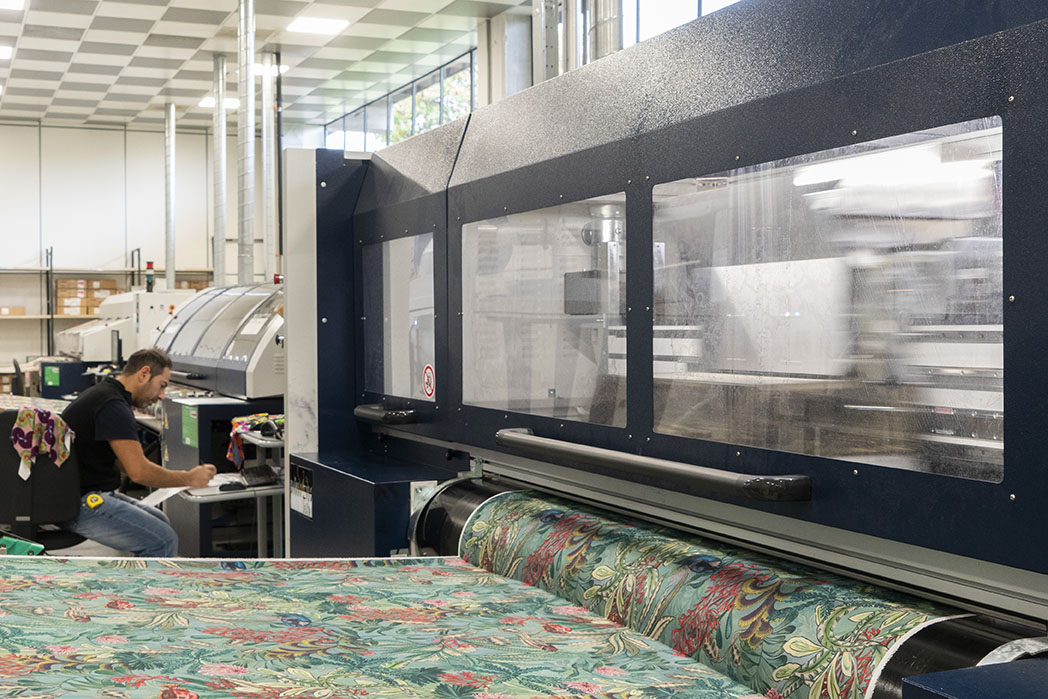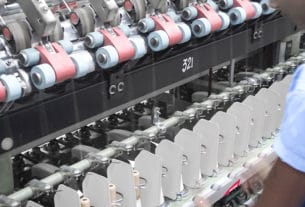Epson, the Japanese pioneer in digital textile printing technology, with its For.Tex and F.lli Robustelli subsidiaries, will display the latest innovations and solutions for the textile market at Hall 3 – Stand C210 in ITMA. For.Tex provides dyes, thickeners and products for pre/post-treatment of fabrics and F.lli Robustelli is a leading company in the engineering and production of textile printers.

ITMA 2019 will be an opportunity for Epson to show its unique Total Solution, a turnkey, integrated system for the textile printing world. Total Solution helps operators seize digital textile market opportunities. The all-inclusive textile digital printing system features Precision Core printheads which are a state-of-the art textile printing technology. Genesta inks have been developed to offer their maximum results using Epson technology and fabric treatment expertise. This system finds its maximum expression in Monna Lisa series, the successful range of industrial printers and a reference for the high-quality textile printing sector.
At the stand, you will experience state-of-the-art Epson technology for Direct to Fabric printing and for the sublimation printing. “Our ITMA 2019 presence confirms Epson’s commitment to the continuous high-quality ink and printer development. Our goal is to become an indispensable technological partner in the high-quality textile printing sector. This includes the DTF market, we developed by launching Monna Lisa together with our partners of excellence F.lli Robustelli and For.Tex. The sublimation solutions where Epson is recognised in every market segment, is part of our complete offer for the printing sector” states Paolo Crespi, Direct To Fabric Sales & Marketing Director EMEAR & Americas.
Focus sustainability
The sustainability issue is a focus for market consumers and operators in the textile industry as well as for ITMA, “Innovation for industry sustainability.” Inkjet printing is a sustainable alternative to traditional printing. The advantages are not only financial and organisational but also ecological. Today’s fashion industry is increasingly sensitive to sustainability issues and is finding in digital textile printing a powerful ally, so that an increasing amount of fabrics are printed using this technology.
As ITMA 2019 approaches, Epson unveils some successful case studies to be presented at the 18th world’s leading textile machinery exhibition. The first case study tells about the mix of tradition and innovation of Mantero Seta, a historic company of the Como textile district in Italy.
Mantero Seta enters digital printing market with the Monna Lisa printers.
Mantero Seta, a Como-based company specialised in the design, production and distribution of luxury fabrics and textile accessories, started its journey towards innovation in the 1990s, which culminated in the adoption of Epson’s Monna Lisa digital printers.

Driven by a desire to be at the forefront and to meet the textile industry’s changing stylistic needs, Mantero combined its traditional screen and roller printing with Epson’s digital printing innovation. After careful research, the Como silk company chose Monna Lisa not only for its high quality but especially for its wide versatility that enables reliable reproduction of many different stylistic variations.
Amongst Monna Lisa’s advantages, Mantero was particularly impressed by the possibility to create both large designs with a wide range of colours and micro designs for ties and accessories where detail is of the utmost importance. An item’s back and front are equally crucial to the accessories market and the fabric colour penetration guaranteed by Epson digital printing is a key element to prevent the image from blurring.
Franco Mantero, Mantero Seta CEO, said: “For us digital printing means Monna Lisa. According to us, the winning features of Monna Lisa have always been the quality and reproducibility of a print, in addition to its reliability and ability to cope with large production volumes.”
Thanks to Monna Lisa and Monna Lisa Evo Tre, the most recent evolution of Epson digital printers which made history for high-quality textile printing, Mantero succeeded in combining tradition and innovation while maintaining the high quality that distinguishes the brand internationally.
Antonio Rezzonico, Production Manager at Mantero Seta, explained: “We print 120,000 metres of fabrics per month. Each Monna Lisa machine produces on average 18,000-25,000 m per month. Six Monna Lisa printers have been installed at Mantero’s Digital Printing Department, which was established five years ago: two Monna Lisa ML in 2014, 1 Monna Lisa Evo Tre in 2015, 1 Monna Lisa Evo Tre in 2017 and the latest two Monna Lisa Evo Tre in 2018.”
The core points of the company’s offer are its Style and Design Department with its approx. 100 employees, and its historic archive. Digital printing, which has become considerably important for Mantero, has provided the company with an excellent means to convey these strengths.
Mantero concluded: “The Mantero 1902 collection is the stylistic expression of designs from our archives and of the new colour variants produced by our designers and digitally printed by Monna Lisa. The combination of these elements continues to produce remarkable results.”
Monna Lisa Evo Tre 32: productivity, quality flexibility, and precision
Developed by Epson in partnership with Fratelli Robustelli, Monna Lisa Evo Tre 32 combines the high quality demanded by the high fashion sector with the productivity required by the dynamism of today’s fashion industry.
The innovative proprietary Epson PrecisionCore printing technology, incorporated for the first time in the Monna Lisa Evo Tre series, enables printers to combine unmatched quality and high productivity with even greater reliability. These features make the printer one of the most versatile digital textile printers in the market.
One of the most important qualities of Monna Lisa Evo Tre is its flexibility. It provides users with a single printer to meet a variety of different production needs. It can print on any type of fabric, from the simplest to the most complex designs, with speed and perfect repeatability.






I like this web site very much, Its a really nice berth to read and incur info .
Glad to be one of the visitants on this awful website : D.